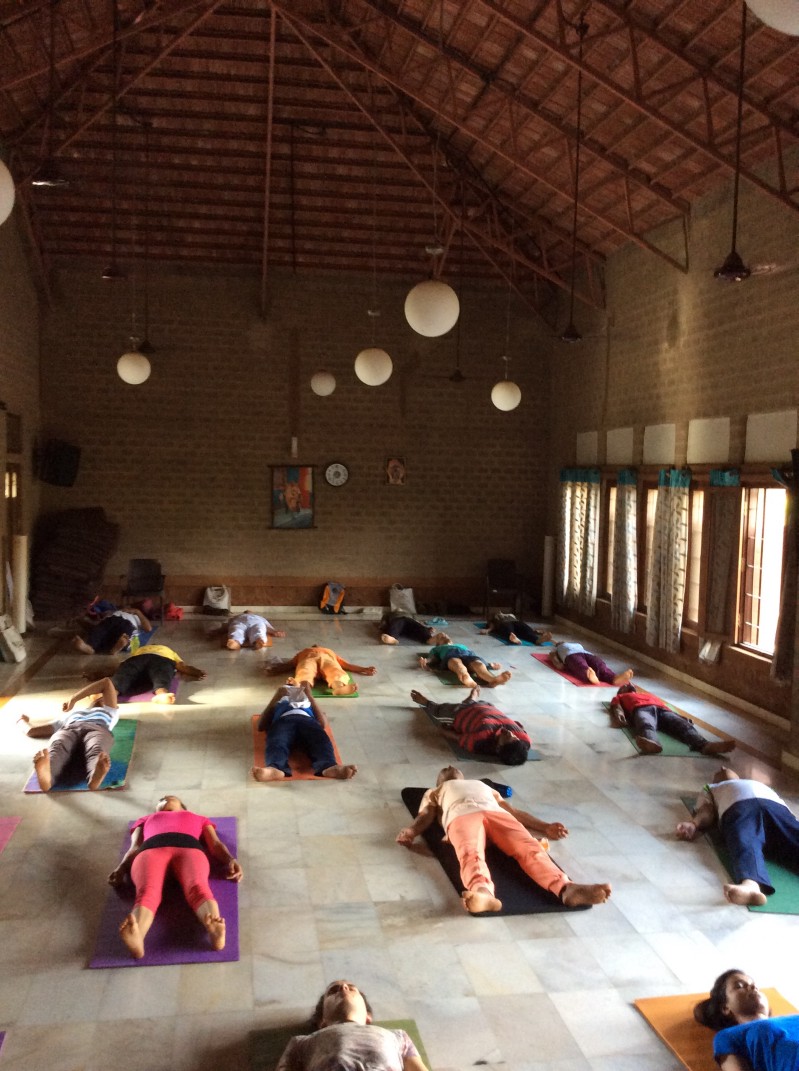Bhakti-Yoga-Ecology: Lessons for environmental consciousness from Yoga at Govardhan Eco Village

(Note: This is Part 1 of the two-part series titled ‘Bhakti-Yoga-Ecology - Lessons for Environmental Consciousness from Yoga at Govardhan Eco Village’. Read Part 2 here).
Bhakti-Yoga
The acclaimed Vedic scholar, teacher and founder of the Krishna Consciousness Movement, A.C. Bhaktivedanta Swami Prabhupada, brought the age old Indian tradition of bhakti-yoga to the western world in the late 1960s and also reinstated its importance in India and globally. The Bhagavad Gita and the Puranas, India’s noteworthy scriptures, elucidate the philosophy of bhakti yoga.
The Sanskrit word ‘bhakti’ means the approach of devotion to a personal God as an interpersonal relationship. It is a yogic path where the devotee’s aim is to have a loving union with God. This relationship can take many forms, such as, seeing God in your parent, child, friend or pet.
Radhanath Swami, a monk in a Krishna-bhakti lineage and bhakti yoga teacher, explains bhakti simply as, “When we speak of bhakti, we could be referring to an emotion, a practice, a school of philosophical thought, a popular movement (the bhakti movement), or a state of consciousness.”
The benefits of bhakti yoga are infinite. Swami Sivananda, a Hindu spiritual teacher and a proponent of yoga and vedanta, lists out some of its numerous benefits, “Bhakti softens the heart and removes jealousy, hatred, lust, anger, egoism, pride and arrogance. It infuses joy, divine ecstasy, bliss, peace and knowledge.”
The bhakti tradition has a universal appeal and cuts across religions. For example, when the Muslim Sufis came to India in the medieval period, they found bhakti reverberating with their own practices, helping create harmony between the two faiths. Such bhakti devotion in fine arts, poetry, music and dance or any practise cultivated ecstatic divinity and love.
Yoga-Ecology
Vedic traditions in India always stressed on sustainability as a reverential relationship with Mother Earth. Swami Prabhupada knew there was a disconnect between nature and society in the modern world, and therefore, he focussed on the ideal of ‘simple living and high thinking’. This profound principle is demonstrated at Govardhan Eco Village (GEV), a farm community under the auspices of Radhanath Swami and the Gopinath Temple in Mumbai, spread over 70 acres at the foothills of the Sahyadri Mountains.
Some examples of living simply are growing your own food and living within the means of your local ecosystem. By following this along with the traditional bhakti yoga heritage in India, we have great potential for enlightenment, even in the 21 st century. GEV highlights the importance of spiritual ecology — the need for us to live in harmony with ourselves, nature and the sacred. Radhanath Swami, in his autobiography explains this sacred interrelationship as,
“There is a sweet transcendental interrelation between all living entities, irrespective of not only caste, creed, and colour between man and man, but between man and beast, man and birds, man and reptiles, man and plants, etc., and so also between man and God, and between God and others, and so on….as such the [farm] shall be the centre for such supreme culture of knowledge. [It] shall set the example that neither God nor the living being nor nature is in any way antagonistic toward one another, but that all of them exist in harmony as a complete whole unit.”
Yoga in Sanskrit literally means ‘to unite’ or ‘combine’. Traditionally, it was practised in retreat in nature. Yoga students nurtured edible and holistic gardens, foraged for wild edible plants and fruit, looked after animals and were taught to live in the wilderness. In this manner, it was conducive for the natural power of yoga to bloom in them. Radhanath Swami lucidly explains, “To unite the body with nature is hatha yoga. To create unity within the mind and the body is pranayama. To create unity within mind and atma (soul) is jnana. To create unity between the soul and God is bhakti. That is the complete yoga system — unity.”
In the setting of today’s pressing socio-environmental issues that we face globally, yoga’s concern for nature is of utmost significance.
Yoga Course at Govardhan Eco Village
Govardhan Eco Village (GEV) hosts, facilitates and conducts a 28 day, residential Certified Yoga Teacher Training Course. This course is based on the tenets of an amalgamation of bhakti, yoga and ecology, in sync with the principal of ‘simple living and high thinking’. The eco village is an ideal locale for the yoga course with its focus on holistic living which includes sustainable Vedic farming practices, animal care and protection, green buildings, ayurvedic wellness centre, water conservation, soil biotechnology, waste management, rural empowerment and education,encouragement of local arts and handicrafts and a plant nursery with indigenous varieties of flora.
The current course from June 12th-July 10th , 2016 is co-taught by a practising yoga couple from Nasik, who follow the traditional style of hatha yoga along with seasoned teachers of bhakti yoga. ‘Hatha’ in Sanskrit literally means ‘force’, indicating a system of physical techniques supplementary to the broader concept of yoga.
Day one of the course began with a ‘yajna’, a ritual in front of a sacred fire, with mantras. A yajna symbolises an auspicious beginning of offering respect to and taking the blessings of God, the Sacred Fire and the Guru. After the all the students participated in the powerful and calming yajna, they were given their welcome kits that included asana mats and books.
The daily schedule of this course is truly holistic as follows:
5:15 a.m. Wake up
6:00 a.m. Mantra Meditation & Daily Prayers
7:00 a.m. Tea Time (Herbal)
7:30 a.m. Asana & Pranayama Class
9:30 a.m. Brunch Prasadam
10:15 a.m. Seva (this includes animal service such as at the goshala or cow shelter and with other animals at the eco-village)
11:30 a.m. Bhagavad Gita/Yoga Philosophy
12:30 p.m. Relaxation Therapy (Yog Nidra)or self-study time
13:30 p.m. Herbal Tea
14:00 p.m. Lecture (Yoga Philosophy/Anatomy)
15:30 p.m Asana andPranayama Class
17:30 p.m. Dinner Prasadam
18:15 p.m Yamuna Aarti/Meditation Walk at Vrindavan Forest
19:30 p.m Meditation and Satsang/Kirtan/Likhita Japa/Talks/Video/Q&A
21:30 p.m Relax/Lights Out
This course coincides with the International Yoga Day on June 21st. June 21st was declared as International Yoga Day, and this was internationally recognised by the United Nations General Assembly (UNGA) on December 11th, 2014.
The prerequisite for signing up for this course is as humble as its principle of ‘simple living and high thinking’. It reads as follows:
‘An open heart with self-motivation for learning would help achieve the objective of the course. Participants need not be yoga teachers or experts — only your sincere desire and commitment for self-improvement is needed. Even if you are not interested in teaching, you are still welcome to experience the ashram and yogic lifestyle for your overall well-being.’
A very happy International Yoga Day to you, today and every day!
Maya Ganesh is a socio-environmental researcher, educator, writer, consultant and natural farming practitioner, with an interest in community-driven sustainable initiatives, closed loop systems, rural-urban linkages, children and the environment, and spiritual ecology. She can be reached on mayaganesh74 (at) gmail (dot) com.






